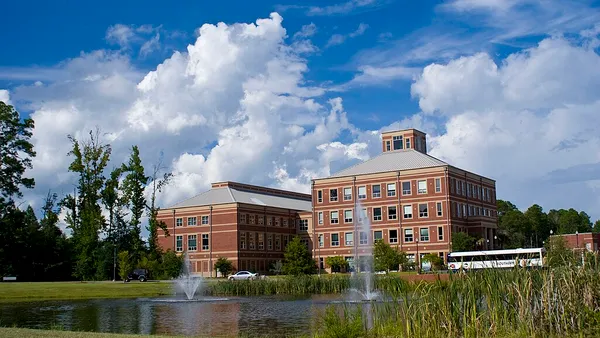Dive Brief:
-
Morgan State University, in Maryland, has ended the practice of hiring contractual staff in an attempt to "address employee inequity in a profound and meaningful way" at the largest historically Black institution in the state, officials announced this week.
-
The public HBCU in Baltimore is also giving certain existing contractual workers full-time status with benefits and is raising its minimum wage to $15 an hour.
-
The conversions are "the moral thing to do," especially given many contractual employees served on the front lines in the height of the pandemic, the university's president, David Wilson, said in a statement. It appears to be the first institution to make such a move during the pandemic.
Dive Insight:
As have many colleges, Morgan State has long depended on contracted staff to augment its workforce in all major areas of its operations. They are most often working within Morgan State's physical plant and custodial services.
Morgan State's contractual workers don't normally get healthcare benefits or paid vacation time. They are typically not subject to cost-of-living raises for state employees.
Now, the university will provide benefits to about 60 full-time workers who have never had them. The boost to its minimum wage will benefit almost 70 employees, officials said. Some contractual workers, like those working under grant funding, will not be converted, a Morgan State spokesperson said. The university employs more than 1,960 people in total.
The pay raise coincides with the state legislature hiking Maryland's minimum wage for large employers from $10.10 to $15 per hour by 2025. The minimum wage goes up in steps and is currently at $11.75 per hour for large employers like Morgan State.
The spokesperson could not immediately provide an estimate of how much the initiative would cost. The university expects to be able to absorb the estimated expense of the employee conversions and wage increases into its operational budget because it is in a strong financial position.
Staff members are the backbone of an institution and are often overlooked when researchers, policymakers and the public think about higher education, Dominique Baker, a professor of education policy at Southern Methodist University, in Texas, said in an email.
She hopes the types of changes Morgan State is making will become more popular, particularly as colleges enter another academic year affected by the pandemic.
"Without these staff members sacrificing, there would have been no way for institutions to even attempt to educate students. They deserve fair compensation and security," Baker said.
The coronavirus pandemic deeply affected contract workers, many of whom found themselves without hours on the job after campuses shuttered last spring when the coronavirus first began to spread. This prompted students at several institutions to call for their schools to keep paying these employees.
The health crisis drove down the number of hourly workers colleges employed from 2020 to this year, according to data from the College and University Professional Association for Human Resources. The number of part-time workers decreased by 17%, and full-time workers dropped by more than 3%.
And the pandemic renewed attention on contingent faculty members. The American Association of University Professors last year said contingent faculty should receive similar benefits to their full-time counterparts, including paid sick leave and unemployment.













